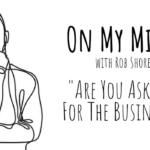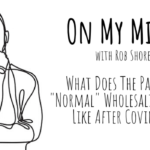Our business has many a slippery slope.
Every day wholesalers are confronted with ethical temptations.
Opportunities and urges to “work around” legal and compliance best practices.
But at what cost?
Trust issues, leadership missteps and ethics problems can threaten any organization, impact market value and cause irreversible damage. Frank C. Bucaro helps leaders and individuals at the best and most admired companies skillfully navigate the high road to success.
Frank’s unique career path from the classroom to the board room began a number of years ago when a succession high profile media reports captured his attention. While still an instructor of moral theology, he became increasingly aware that problems relating to unethical practices in the marketplace seemed to be on the increase.
He is a business owner and author of the book The Trust Puzzle: How to Keep Your Company on the Ethical High Road. His articles have been published in a variety of industry publications and in ethics and compliance magazines such as Compliance & Ethics Professional, Corporate Compliance INSIGHTS, and ETHISPHERE.
A member of the National Speakers Association, he has earned their designation of CSP which stands for Certified Speaking Professional and he was also presented with NSA’s prestigious CPAE Speaker Hall of Fame Award for excellence and professionalism.
Wholesaler ethics is not an oxymoron.
First let’s dispel the notion that compliance and ethics are the same. No, they are not.
- Compliance is the letter of the law and ethics is the spirit of the law. Different but relatable but not interchangeable. They need to complement each other. So, which comes first? Spirit of the law or the letter of the law?
- Compliance is a reactive mode, and ethics is only a proactive mode. What this means is that to be a complaint is to do what some entity, i.e. law says to do. Being complaint is a reactive choice. Ethics is a personal choice. One must choose to be ethical. One takes personal responsibility for one’s choices.
Compliance is playing by enforceable rules. Ethics is obedience to the unenforceable.
Next, let’s talk about the issue of a moral compass. There seems to be a lack of moral courage, moral leadership and moral accountability in today’s business world.
Let me share with you what one of my clients said about having a moral compass.
“It is when one is in touch with one’s innate sense of morality and can feel the moral component of events. Someone who does not have moral awareness does not notice the moral clues provided to him/her by one’s psyche-the same way that someone who does not listen to his/her body may miss the signs of cancer or disease until they are very pronounced.”
So what are the warning signs of missing these moral clues? Here are six.
- When ego replaces insight. What does this mean? This means that when your ego( not self-esteem here) dictates to you what to do without being open to other options, opinions, etc.
One becomes a one person “show” believing that one has all that one needs to know to make the best possible decision on any issue. This is dangerous stuff, so leave your ego at the door. To look for insights is a strong positive self-esteem example.
- When what you do is inconsistent with what you preach. Please remember that people listen with their eyes and not their ears. What you do is so much important that what you say! All companies have values that they embrace and publicize. To advertise them, and promote them and those values are not observed in your behavior causes mistrust in business relationships.
- For what do you compromise your values? This can be a positive or a negative. The negative is that you would choose money, i.e. the sale over values when “push comes to shove, ” and it may not be the right thing to do. The positive compromise happens when the needs of individuals take precedence over money, or when relationships are more important the sale. Is there a consequence for each choice? What do you think?
- When we look for scapegoats rather take responsibility. When you find yourself in a situation where either you admit to something or you look for a scapegoat so you won’t have to deal with the consequence of your behavior, go slow and choose well. When you look for scapegoats you proactively destroy your credibility, reputation, loyalty and will not ever be trusted again to do your job effectively. Bottom line is if you did it, admit it, and take the consequences. This will do you more good with those around you, who work with you, etc. than if you tried to find a scapegoat for your actions and decisions.
- Moral awareness is a proactive activity. As the quote above says, one needs to be aware of and embrace one’s values(like what your body is telling you) BEFORE a decision is made so that one can make the best decision, based on what you have perceived.
Knowing yourself is a question of values. In business as in life one can’t substitute rules for values!
- Being in a reactive mode will erode the “spirit” and finances. To be reactive is to “give up” one’s expertise, knowledge, values, etc. to someone else’s will. When one does this, your psyche “takes a hit” because of you “giving in” and this is especially true in business dealings when discussing fees or price. Believe in you, your product and the benefits to your customer! When you come across that way, with those right reasons, you can’t lose.
What can you do to be more aware of these moral clues?
Consider a pond. No matter how big or small a rock is when you throw a rock in a pond there are ripples. The bigger the rock the bigger the ripples, the smaller the rock the smaller the ripples, but no matter what, there are ripples!
No matter how big or small your decisions are there ripples or in this case, causes and effects of your decision making.
When is the best time to think about what ripples you will cause?
After you’ve thrown the rock or while you’re holding it? After you’ve made the decision and thrown the rock, it’s too late. You are now fully accountable for what you decided.
If you ever not sure about anything regarding your decision, hold, hold, hold the rock and get more information, to make the best decision possible and then throw the rock” and take full responsibility for each and every “ripple.”
Written by Frank Bucaro


 Wholesaler Masterminds Radio Pod Pack #3: Wholesaler Self Improvement
Wholesaler Masterminds Radio Pod Pack #3: Wholesaler Self Improvement How to Reduce Friction in Advisor Appointments: Wholesaler Tech Talk with Dave Lubnik from YCharts
How to Reduce Friction in Advisor Appointments: Wholesaler Tech Talk with Dave Lubnik from YCharts Be Bold, Be Brief and Be Gone with Jimmy Pomerance
Be Bold, Be Brief and Be Gone with Jimmy Pomerance On My Mind: Are You Asking For The Business?
On My Mind: Are You Asking For The Business? On My Mind: Part One – What Does The Path To “Normal” Wholesaling Look Like After Covid-19?
On My Mind: Part One – What Does The Path To “Normal” Wholesaling Look Like After Covid-19?